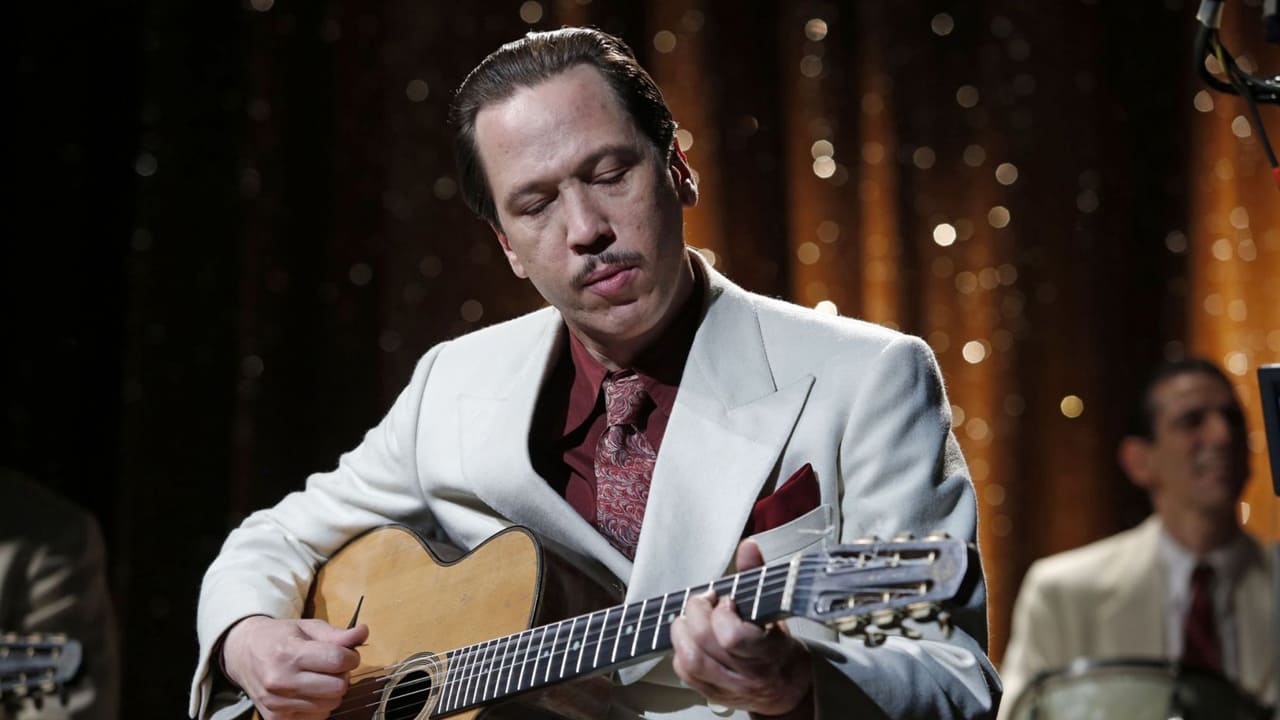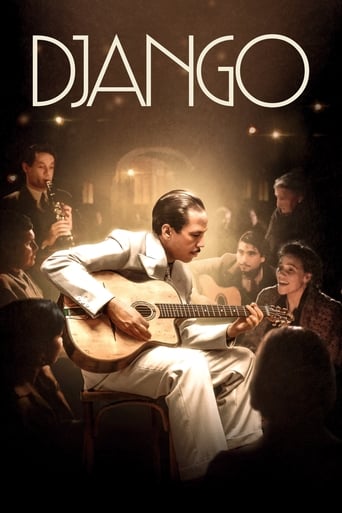

Let's be realistic.
... View Moreeverything you have heard about this movie is true.
... View MoreAdmirable film.
... View MoreYour blood may run cold, but you now find yourself pinioned to the story.
... View MoreGreetings again from the darkness. Don't mistake this for either the Franco Nero (1966) or Jamie Foxx (2012) movie. This latest from writer/director Etienne Comar centers on Django Reinhardt, one of the most talented and influential musicians of the twentieth century. Based on the novel "Folles de Django" by Alexis Salatko, the story follows the challenges of his escape from German-occupied France.He is already a renowned (and enigmatic) performer when the film kicks off in 1943 Ardennes, as Django and his band are being contracted by the Nazis to tour and entertain the troops. Of course, he refuses to sign the contract and tour under their terms with limit the style of music he can play. Because of this, Django and his family must flee and disappear underground, while they plan an escape to Switzerland. His musical influence proliferated the area, and his influence and respect is clear at each step of his travels. In fact, it's the musical pieces and segments that really stand out here. Reda Kateb (A PROPHET, 2009) gives a terrific and expressive performance as Django, but the musical portions are so outstanding, that we find ourselves not as engaged in the personal saga of escape as we should. Clearly, the war and Nazis are a threat, and when Django says "I'm a musician. It's what I do", that serves as his admission that he takes an apolitical stance and does not envision himself as a hero to the people.As a driving force behind European jazz, and being such an influence on so many guitar players, Django's legacy is something other than as a war icon. The film certainly could have benefitted from more attention to either how his music gained popularity, or what drove him to avoid any political notoriety until it was too late for many of his fellow Gypsies. Admittedly, his escape was crucial and led to his 1945 score, "Requiem for Gypsy Brothers", of which his conducting leads to the most emotional moment of the film.
... View MoreThis film covers mostly 1943 as well as a bit in May, 1945 at the end. So, obviously this film is not Django Reinhardt's entire life story. It's a shame but I can certainly understand why they chose this path. If you want to know more about the man, check Wikipedia and go from there.The film picks up in the middle of WWII. Django is a big star in Paris and is even loved by the occupying Nazis. What makes this so unusual is that he was one of the Romani (aka Gypseys) and they were hated and persecuted by the Reich. Additionally, he played swing...a style music associated with black Americans...a group also despised by the German government. Problems develop when the Nazis insist he do a tour of Germany and Django is worried he'll never return. So, they decide to make a run for it. The movie is all about this period of time.The film is something I really appreciated because tons of films have been done about the Jewish Holocaust. These are excellent films but the Romani were also gassed in large numbers and I can't think of a single film that covers it other than this one. It makes for a sad viewing experience...but also a masterfully crafted one well worth your time.
... View MoreA splendid gripping film, released on the day we Dutch honor all those who have fallen during the 2nd World War. The captivating acting and the way in which the film was shot, immerses you in and meanders you along a distressing part of Django Reinhardt's life. The spellbinding music in the film, paying homage to Django Reinhardt's innovative jazz with an infusing Gypsy flavor, will stay with you for the rest of your life. And if you ever have the good fortune to visit the chapel of Saint-Pierre in Villefrance-sur- Mer (France) and look at the details of the wall paintings by Jean Cocteau, you will realize what a big impact Django has made on lots of people.
... View MoreThe opening film of the Berlinale competition is yet another take on the sufferings brought on by the second World War. In a mixture of biopic and historical drama, Django fails in standing out from the crowd, walking down the one- dimensional route of escape from Nazi persecution, while rendering its characters secondary.Django Reinhardt, a guitarist of Romani ethnicity, is dazzling the crowds in Paris during the later days of the German occupation. The specter of deportation looms over his family, his band, yet he refuses to accept the idea that anyone would harm him, due to his positive notoriety. However, after declining to tour in Germany, a quick visit to a local police station makes him see the light, as he flees close to the Swiss border, awaiting transfer. There, he comes across a local Romani camp and they come together to perform music in the area, as a means for survival. That's pretty much the gist of the story, which is as bland as it sounds. After a great opening scene, followed by an equally impressive musical performance, the movie drifts into this grey area where not much happens. Reda Kateb's performance is strong enough to retain some interest, yet the production lingers without delving deeply into either Django's person, nor the plight of the Romani people. Whenever music starts playing, the film comes to life, but this is not sufficient to keep a rhythm.It's a shame, really, because there are glances of why Reinhardt could have been a relevant leading figure. Being unable to read or write, and bearing a childhood injury on his playing hand,his performances come from a deeply rooted passion for music, seemingly instilled by his Romani heritage and culture. This generates the contrast of music from the heart and music from the head, which is not subtle, yet it plays well with how ridiculously rigurous and lifeless Nazi censorship was. The close knit relations with his family, band and the fellow survivors he meets at the Swiss camp are well shaded against Reinhardt's privileged position, and his sense of entitlement. Yet, there is no clear sense of inner conflict, although the movie does imply that his personal quest is to learn some self sacrifice, putting himself second.This is part of the problem, that Django just can't set itself apart and come across without conviction. Supporting characters have little to no personality, and function as either plot enhancers, or easy to swap band members. Only the relationship between Reinhardt and his mother is distinguishing, even if it feels at times like comic relief. The generic portrayal of the Nazi oppressors doesn't help either, as is the case with some of the elliptical moments in the story. Even the name of the movie should have given pause for thought: how does one make something distinctive with such an overused title?Django would have been a much better experience, had it stuck to its music, especially as some of the artist's work was lost, which is a cause for grief. As another survival movie from the war, it falls flat, especially compared to some of the previously released hard-hitting productions, be they grim or soulful representations of the horror.
... View More